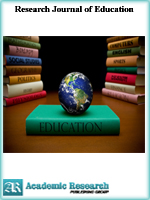Research Journal of Education
Online ISSN: 2413-0540
Print ISSN: 2413-8886
Print ISSN: 2413-8886
Quarterly Published (4 Issues Per Year)

Archives
Volume 6 Number 7 September 2020
Some Constraints in Using ICT and its Impact on EFL Teachers in Saudi Arabia
Authors: Dr. Yousef Hamad A. Al-Maini
Pages: 92-96
DOI: doi.org/10.32861/rje.67.92.96
Abstract
Nowadays, our world is experiencing a technological revolution and witnessing an explosion in the field of information and communication. The use of technology in English education is one of the developments associated with this contemporary scientific and technological advance. This paper discusses some issues which Saudi English teachers encounter in using technology in teaching English subjects at intermediate schools in Riyadh, Saudi Arabia. Taking a qualitative approach, the researcher focuses on the status of using technology in two intermediate schools. A discrepancy is found between intention and practice. During investigations and observations throughout the district, the researcher could not find a language laboratory in government intermediate schools. In this paper, the researcher will discuss three issues respectively as follows: teacher resistance, lack of training and self-confidence, and financial obstacles.
Factor Affecting Secondary Education Level of the Girl Child in Gucha Sub-County, Kisii, Kenya
Authors: F. Odera ; D. Momanyi
Pages: 77-91
DOI: doi.org/10.32861/rje.67.77.91
Abstract
There are wide disparities between the proportion of men and women not only in higher education but also down to the elementary levels. Some researchers have found out that the percentage of women in higher education in Africa is less than 20 percent. ln Nyanza province for instance, record have it that the student who scored plain A in Kenya Certificate of Secondary Education from Ogembo division was only one girl out of 268 students who sat for the examination in Gucha Sub county. Indeed, if this trend continues, there is fear that in future we may not be able to produce female students especially from rural areas joining professional courses such as Law, Pharmancy, and Engineering among others. The purpose of this study was to identify the factors that affect girls’ secondary education achievement level and to establish the possible measure that would be taken to in order to improve the girl-child education. The research question included-what factor affects the secondary education level of the girl child and what possible measures would be taken to improve the girl-child secondary education level. Both stratified and simple random sampling techniques were used to find out the sample for the study. Questionnaire was used to collect data and observation schedule of records in schools. Data collected was analysed by use of descriptive statistics and results presented in percentage means and frequency counts. Conclusions and recommendation were also made based on research findings.
The Effect of Philosophical Inquiry Program in Improving Academic Participation Among Secondary Graders in Malaysia Arabic School
Authors: Dawood A. Al-Hidabi ; Mohammed H. Al-Arrja ; Mohammed F. Abu owda
Pages: 72-76
DOI: doi.org/10.32861/rje.67.72.76
Abstract
This study aimed to identify the effect of a philosophical inquiry program in improving Academic participation among secondary graders in Malaysia Arabic School. Quasi-experimental approach was followed in this study. To achieve the study aim, the tool of the study were a philosophical inquiry (PI) and an academic participation questionnaire. The sample of the study was Twelfth graders in Saudi Arabia Schools in Kalu Lampour who were 39 students. The results of the study showed that there were statistically significant differences between the mean scores of the secondary graders in improving Academic participation in favor of the post application of the tools.
Relationship Between Teachers and Students for Motivation (A Case Study of Community School of Nepal)
Authors: Shankar Bahadur Rawal
Pages: 63-71
DOI: doi.org/10.32861/rje.67.63.71
Abstract
This research paper is focused to analyze how teachers - students’ relationship plays a crucial role in students’ motivation in learning. This paper is based on the Gardner model of motivation. By adopting a qualitative method approach and a phenomenological research design, the research paper has been prepared. Convenience sampling technique has been used in it. Data were collected by using a questionnaire and unstructured interview via telephone. Four issues were identified between the teachers-student’s relationships throughout the unstructured interview: the importance of teacher-student relationship, teacher expectation, students’ motivation, and increase in academic learning. The delimitation of this researcher was to collect the data from the telephone call due to the high transmission and risk of communicable diseases like corona virus (COVID -19) spreading all over the world. The research found out that, the better contact and mutual relationship between teachers and students result in higher students’ motivation in learning.



